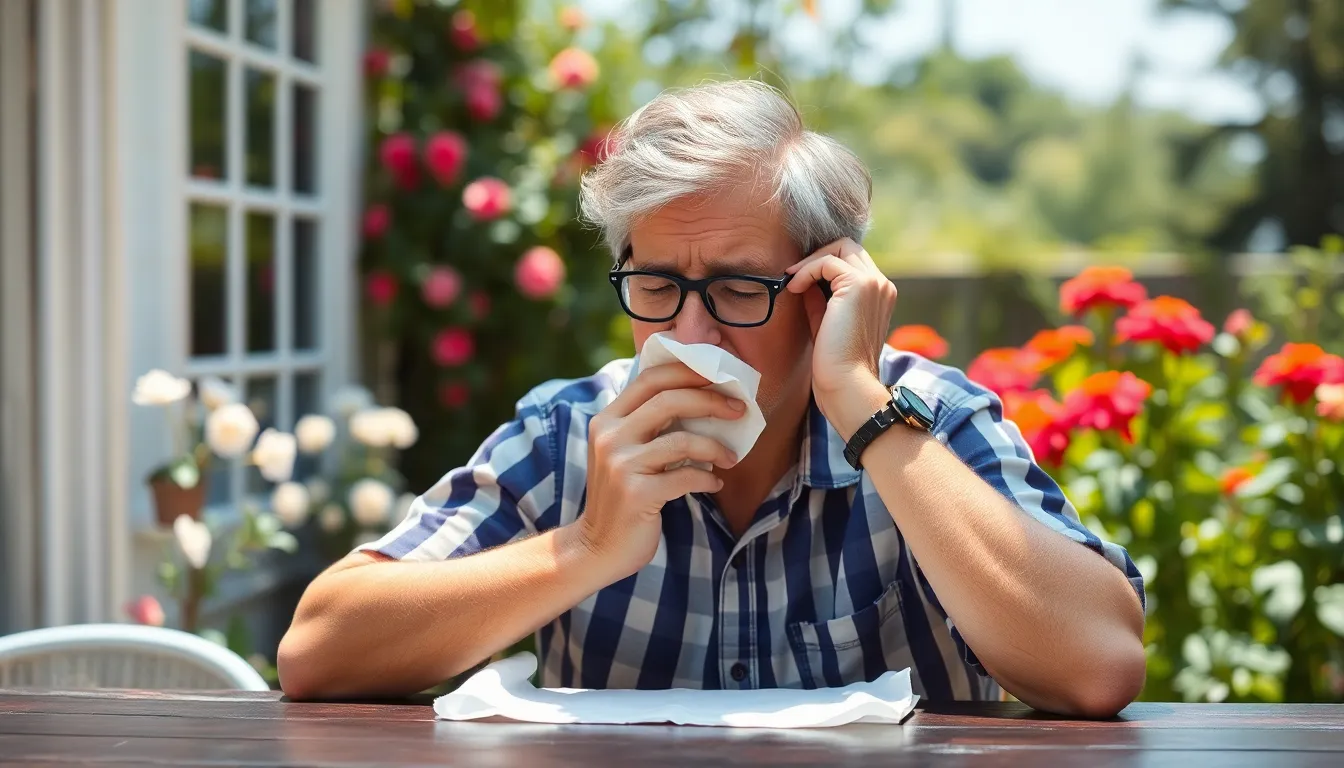Table of Contents
ToggleAllergies can feel like that uninvited guest who crashes your party and refuses to leave. Whether it’s pollen, dust, or pet dander, these pesky triggers can turn a sunny day into a sneezing marathon. But don’t despair! There are plenty of ways to kick those allergens to the curb and reclaim your life.
From clever home hacks to over-the-counter remedies, tackling allergies doesn’t have to be a daunting task. With a little knowledge and a sprinkle of humor, anyone can navigate the sneeze-inducing maze of allergens. So let’s dive into some effective strategies that’ll help ease those sniffles and get you back to enjoying life—without the constant itch and sneeze.
Understanding Allergies
Allergies represent an overreaction of the immune system to typically harmless substances. They can disrupt daily life, causing discomfort and health issues.
What Are Allergies?
Allergies occur when the immune system mistakenly identifies a harmless substance as a threat. This misperception triggers the release of chemicals, particularly histamine, leading to symptoms. Individuals affected may experience sneezing, itching, and difficulty breathing. Different types of allergies exist, including seasonal, food, and contact allergies. Each type has unique triggers and symptoms that vary among individuals.
Common Allergens
Pollen ranks among the most notorious allergens, causing seasonal allergies in many people. Dust mites, microscopic creatures found in bedding and carpets, often contribute to indoor allergies. Pet dander, tiny flakes from animals, can provoke reactions in sensitive individuals. Mold spores, present in damp areas, also serve as significant allergens. Additional allergens include certain foods, like peanuts and shellfish, which can cause severe reactions for some people. Understanding these common allergens aids in managing exposure and minimizing symptoms.
Symptoms of Allergies

Allergies manifest in various ways, impacting individuals differently based on their sensitivity to allergens. Common symptoms include sneezing, itching, runny or stuffy nose, and skin rashes.
Recognizing Allergic Reactions
Recognizing allergic reactions is essential for managing symptoms effectively. Immediate signs may include hives, swelling, and difficulties breathing. Individuals may also experience stomach cramps and nausea, especially with food allergies. Understanding these symptoms helps identify the culprits, allowing for timely intervention.
Impact on Daily Life
Allergies can significantly affect daily life, disrupting routine activities. Sneezing fits and constant itching can lead to difficulties concentrating at work or school. Allergic reactions often result in missed social events, limiting participation in activities. Sleep disturbances caused by congestion can contribute to fatigue and irritability. By acknowledging these impacts, individuals can better tailor their strategies for effective management.
Effective Strategies to Help with Allergies
Managing allergies effectively involves various strategies that address different triggers. Each method can play a role in alleviating symptoms and improving quality of life.
Home Remedies
Natural solutions can provide relief for mild allergy symptoms. Saline nasal rinses help clear allergens from nasal passages, reducing congestion. Honey sourced locally may improve tolerance to local pollen. Additionally, consuming foods rich in omega-3 fatty acids, like fish and flaxseeds, supports overall immune health. Herbal teas, such as peppermint and chamomile, also possess anti-inflammatory properties, which can soothe irritated airways.
Over-the-Counter Medications
Many individuals find relief from allergies through readily available medications. Antihistamines, such as loratadine and cetirizine, help reduce sneezing and itching. Decongestants, like pseudoephedrine, relieve nasal congestion by shrinking blood vessels in the nasal passages. Eye drops formulated for allergies can alleviate itchy, watery eyes. Combination medications may offer a broader range of relief for those experiencing multiple symptoms simultaneously.
Allergy Shots and Treatments
For individuals dealing with severe allergies, immunotherapy proves beneficial. Allergy shots involve regular injections of small amounts of allergen, gradually desensitizing the immune system. This treatment option requires commitment over a period, typically spanning several months to years. Alternative therapies, such as sublingual immunotherapy, allow patients to take allergen extracts in tablet form. Both approaches enhance tolerance and can significantly decrease allergy-related symptoms over time.
Lifestyle Changes to Mitigate Allergies
Implementing key lifestyle changes can significantly reduce allergy symptoms. Focus on dietary adjustments, managing indoor environments, and taking outdoor precautions.
Diet and Nutrition
Incorporating anti-inflammatory foods into the diet can help alleviate allergic reactions. Fresh fruits and vegetables, particularly those high in vitamin C, support immune health. Fatty fish, nuts, and seeds provide essential omega-3 fatty acids, which combat inflammation. Some people find relief from consuming local honey, as it may help build tolerance to local pollen. Whole grains, legumes, and plant-based proteins contribute to overall well-being, making a balanced diet crucial.
Managing Indoor Environment
Keeping indoor spaces clean plays a vital role in controlling allergens. Regularly vacuuming carpets and upholstery removes dust mites and pet dander. Using high-efficiency particulate air (HEPA) filters in air purifiers and HVAC systems can trap allergens effectively. Maintaining humidity levels below 50% reduces mold growth, while washing bedding in hot water once a week eliminates dust mites. Simple changes like removing carpets or using hypoallergenic pillow covers can also improve indoor air quality.
Outdoor Precautions
Taking precautions while outdoors helps minimize allergy exposure. Checking pollen forecasts before heading outside allows for better planning. Wearing sunglasses and a hat protects eyes from pollen, while long sleeves and pants shield the skin. Showering and changing clothes after outdoor activities washes away allergens. Staying indoors during high pollen counts, especially in the morning, can further reduce symptoms and promote comfort.
Managing allergies doesn’t have to feel overwhelming. With a variety of strategies available it’s possible to find relief and regain control over daily life. From home remedies to over-the-counter medications there’s an approach for everyone.
Making thoughtful lifestyle changes can also play a significant role in reducing symptoms. By staying informed about allergens and implementing practical solutions individuals can improve their quality of life.
Ultimately taking proactive steps toward managing allergies can lead to a more enjoyable and fulfilling experience. Embracing these strategies empowers individuals to tackle their allergies head-on and live life to the fullest.







